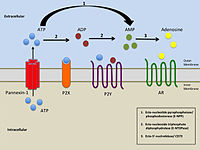
Photo from wikipedia
The methylglyoxal elicits diverse adverse effects on the body. Uridine diphosphate, an extracellular nucleotide, plays an important role as a signaling molecule controlling vascular tone. This study aimed to evaluate… Click to show full abstract
The methylglyoxal elicits diverse adverse effects on the body. Uridine diphosphate, an extracellular nucleotide, plays an important role as a signaling molecule controlling vascular tone. This study aimed to evaluate the relationship between methylglyoxal and uridine diphosphate-induced carotid arterial contraction in rats. Additionally, we examined whether p38 mitogen-activated protein kinase (MAPK) would involve such responses. Organ baths were conducted to determine vascular reactivity in isolated carotid arterial rings, and western blotting was used for protein analysis. Treatment with methylglyoxal to carotid arterial rings showed concentration-dependent augmentation to uridine diphosphate-induced contraction in the absence and presence of NG-nitro-L-arginine, which is a nitric oxide synthase inhibitor, whereas, methylglyoxal did not affect serotonin- or isotonic high K+-induced contraction in the presence of a nitric oxide synthase inhibitor. Under nitric oxide synthase inhibition, SB203580, which is a selective p38 MAPK inhibitor, suppressed uridine diphosphate-induced contraction in both the control and methylglyoxal-treated groups, and the difference in uridine diphosphate-induced contraction was abolished by SB203580 treatment. The levels of phosphorylated p38 MAPK were increased by methylglyoxal in carotid arteries, not only under the basal condition but also under uridine diphosphate stimulation. The suppression of uridine diphosphate-induced contraction by a highly selective cell-permeable protein kinase C inhibitor bisindolylmaleimide I was observed in the methylglyoxal-treated group but not in the controls. Moreover, methylglyoxal-induced augmentation of uridine diphosphate-induced contraction was prevented by N-acetyl-L-cysteine. These results suggest that methylglyoxal could enhance uridine diphosphate-induced contraction in rat carotid arteries and may be caused by activation of p38 MAPK and protein kinase C and increased oxidative stress.
Journal Title: European journal of pharmacology
Year Published: 2021
Link to full text (if available)
Share on Social Media: Sign Up to like & get
recommendations!